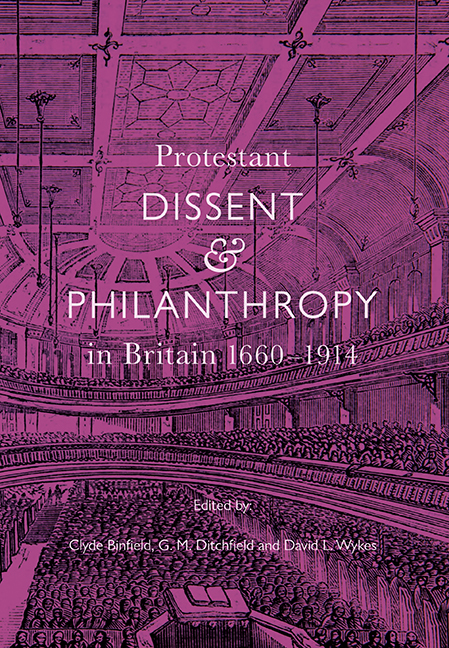Book contents
- Frontmatter
- Dedidcation
- Contents
- List of Illustrations and Tables
- List of Contributors
- Acknowledgements
- List of Abbreviations
- Introduction
- 1 Dissent and Charity, 1660–1720
- 2 Dissenters and Charity Sermons, c. 1700 to 1750
- 3 John Howard, Dissent and the Early Years of Philanthropy in Britain
- 4 Rational Philanthropy: Theory and Practice in the Emergence of British Unitarianism, c. 1750–1820
- 5 David Nasmith (1799–1839), Philanthropy Expressed as Campaigning
- 6 Building Philanthropy: The Example of Joshua Wilson (1795–1874)
- 7 Funding Faith: Early Victorian Wesleyan Philanthropy
- 8 Unitarians and Philanthropy After 1844: the Formation of a Denominational Identity
- 9 Children and Orphans: Some Nonconformist Responses to the Vulnerable in Victorian Britain
- 10 The Rowntree Family and the Evolution of Quaker Philanthropy, c. 1880 to c. 1920
- 11 ‘Not slothful in business’: Enriqueta Rylands and the John Rylands Library
- Select Bibliography
- Index
- STUDIES IN MODERN BRITISH RELIGIOUS HISTORY
8 - Unitarians and Philanthropy After 1844: the Formation of a Denominational Identity
Published online by Cambridge University Press: 21 March 2020
- Frontmatter
- Dedidcation
- Contents
- List of Illustrations and Tables
- List of Contributors
- Acknowledgements
- List of Abbreviations
- Introduction
- 1 Dissent and Charity, 1660–1720
- 2 Dissenters and Charity Sermons, c. 1700 to 1750
- 3 John Howard, Dissent and the Early Years of Philanthropy in Britain
- 4 Rational Philanthropy: Theory and Practice in the Emergence of British Unitarianism, c. 1750–1820
- 5 David Nasmith (1799–1839), Philanthropy Expressed as Campaigning
- 6 Building Philanthropy: The Example of Joshua Wilson (1795–1874)
- 7 Funding Faith: Early Victorian Wesleyan Philanthropy
- 8 Unitarians and Philanthropy After 1844: the Formation of a Denominational Identity
- 9 Children and Orphans: Some Nonconformist Responses to the Vulnerable in Victorian Britain
- 10 The Rowntree Family and the Evolution of Quaker Philanthropy, c. 1880 to c. 1920
- 11 ‘Not slothful in business’: Enriqueta Rylands and the John Rylands Library
- Select Bibliography
- Index
- STUDIES IN MODERN BRITISH RELIGIOUS HISTORY
Summary
In the mid-nineteenth century the Baptists, Congregationalists and Unitarians were supported nationally by a number of major charities. Some, such as the Presbyterian Fund and the Congregational Fund, dated from the last decade of the seventeenth century, others, such as the Lady Hewley's Charity and the Particular Baptist Fund, from the first decades of the eighteenth century, and the support they provided was still significant over a century later. Yet more had been established at the end of the eighteenth century, such as the largely Congregational London Missionary Society and the Baptist Missionary Society, or at the beginning of the nineteenth century, a period when evangelical dissent grew vigorously. Unitarians responded with their own funds intended to propagate Unitarianism. All three denominations had benevolent societies for the support of their indigent ministers, or the widows and families of ministers. Surprisingly they still co-operated in distributing grants from the ‘Society for the relief of Aged and Infirm Protestant Dissenting Ministers’ established in 1818, though there was an attempt to exclude ministers who were not doctrinally orthodox from benefitting. They also supported their own colleges for training students for the ministry. There were nevertheless important differences. The Baptists and Congregationalists were involved in two major areas, overseas missions (and later home missions to convert the heathen at home) and chapel building, both involving significant denominational engagement and fund-raising, areas in which Unitarians did not engage nationally. There were other important differences between the three denominations. The Congregational Union of England and Wales was founded in 1831, and the Baptist Union of Great Britain in 1832, but the Unitarians lacked an effective national organisation. In 1825 the Unitarian Fund and a number of other Unitarian bodies established to propagate unitarian doctrine were brought together to form the British & Foreign Unitarian Association (B&FUA), which was the only central organisation for Unitarians until 1928, but it was poorly supported. The Unitarians were easily the smallest of the three denominations, with only 250 congregations in 1852, mainly inherited from the English Presbyterians. The Congregationalists were the largest with over 3,200 congregations in England and Wales by 1851. The Baptists had 1,134 churches organised in associations by this date.
- Type
- Chapter
- Information
- Protestant Dissent and Philanthropy in Britain, 1660–1914 , pp. 152 - 168Publisher: Boydell & BrewerPrint publication year: 2020



